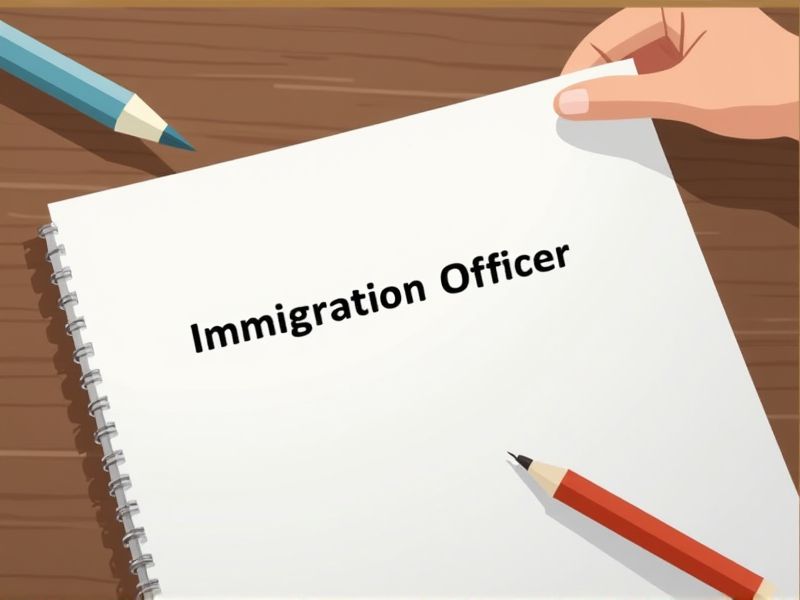
Immigration officers handle complex and sensitive legal matters, necessitating a strong foundation in relevant laws and procedures. Certifications ensure that officers are up-to-date with the latest immigration policies and compliance requirements. They also equip officers with essential skills for handling diverse immigrant backgrounds and languages. Below are some important certifications you may need as an Immigration Officer.
Immigration Law and Policy Certification
Immigration Law and Policy Certification is needed for an Immigration Officer to ensure they understand the complex legal framework governing immigration processes. Certification equips officers with skills to accurately assess applications, reducing errors and improving service efficiency. A well-structured certification program can enhance officers' ability to identify and address potential legal issues, ensuring compliance with the law. Enhanced knowledge fosters public trust and optimizes resources by minimizing legal challenges and appeals.
Border Security and Enforcement Certification
The complexity of immigration laws necessitates the Border Security and Enforcement Certification for immigration officers to ensure they are well-versed in legal protocols. This certification equips officers with the necessary skills to handle various scenarios, reducing the risk of unauthorized entries. By standardizing training, the certification ensures a uniform approach to border security and enhances national safety. Increased public trust in immigration enforcement arises from officers' adherence to regulated standards and practices.
Customs Compliance Certification
Customs Compliance Certification ensures that immigration officers understand regulations and can accurately identify any discrepancies in import-export documentation. This certification reduces the likelihood of illegal goods entering the country, maintaining national security and economic stability. It enhances the officers' ability to work within a framework of international trade laws, promoting efficient and lawful cross-border movements. Adequate training through this certification increases trust between nations by ensuring proper adherence to agreed-upon standards.
Homeland Security Fundamentals Certification
Homeland Security Fundamentals Certification equips immigration officers with the latest knowledge in security protocols, enhancing border protection efficiency. The certification ensures officers are well-versed in counter-terrorism strategies, fostering a safer national environment. It also provides a standardized understanding of immigration laws, reducing procedural errors during inspections. Furthermore, the certification promotes a culture of ongoing professional development, keeping officers updated with evolving security threats.
Cultural Competency and Diversity Certification
Cultural competency and diversity certification equips immigration officers with the skills to understand and respect diverse backgrounds, reducing biases in their decision-making processes. This training fosters effective communication, enhancing interactions with individuals from various cultural groups. Lack of cultural awareness can lead to misunderstandings, potentially impacting immigration outcomes adversely. Certification improves officers' ability to create a more inclusive environment, promoting trust and cooperation among immigrants.
Crisis and Emergency Management Certification
Crisis and Emergency Management Certification equips immigration officers with essential skills to handle unpredictable and high-pressure situations effectively, which can frequently occur at borders and during immigration processes. Training in crisis response enhances decision-making abilities, reducing the risk of errors and enhancing the protection of human rights. Certification in this area demonstrates a commitment to professionalism, potentially leading to increased trust from the public and enhancing the reputation of immigration services. Proper emergency management training ensures that officers are better prepared to collaborate with other agencies, streamlining efforts during emergencies and improving overall response efficiency.
Conflict Resolution and Negotiation Certification
Immigration officers often encounter diverse cultural backgrounds, leading to misunderstandings that a conflict resolution certification helps address. The negotiation skills gained from such a certification enable officers to de-escalate tense situations effectively. Proper resolution techniques contribute to smoother processing and fewer complaints from immigrants. Certification ensures officers handle disputes professionally, maintaining the integrity and fairness of the immigration process.
Risk Assessment and Management Certification
Immigration officers face complex scenarios that involve assessing potential threats and ensuring border security, making risk assessment and management certification crucial. Enhanced skills in this area lead to more accurate threat evaluations, ensuring only qualified individuals are granted entry. Certification equips officers with systematic methods to manage uncertainties, reducing potential legal and security complications. Competency in risk management elevates an officer's decision-making, promoting efficient and safe immigration processes.
Ethics and Integrity in Public Service Certification
Ethics and integrity in public service certification is needed for immigration officers to ensure fair and just treatment of individuals seeking entry into a country, as their roles involve critical decision-making that impacts people's lives. Rigorous certification helps in minimizing corruption and abuse of power, which can compromise national security and public trust. This training also equips officers with the ability to handle sensitive information responsibly and protects the confidentiality of applicants. Upholding ethical standards fosters consistency in immigration processes, contributing to better international relations and adherence to legal obligations.
Human Rights and International Law Certification
Immigration officers often encounter complex situations where understanding human rights and international law is essential to making informed decisions. A certification in these areas ensures officers are well-equipped to identify and address potential human rights violations. Such training can enhance the credibility and professionalism of immigration agencies by demonstrating a commitment to lawful and ethical practices. The certification provides officers with the necessary tools to navigate the legal complexities of immigration while safeguarding the dignity and rights of individuals.
Summary
When you obtain certifications as an Immigration Officer, expect enhanced credibility and professional growth. This increased expertise can lead to more efficient and accurate processing of applications. The certifications often open doors to career advancements and specialized roles. Overall, improved decision-making results in better outcomes for immigrants and the immigration system.
